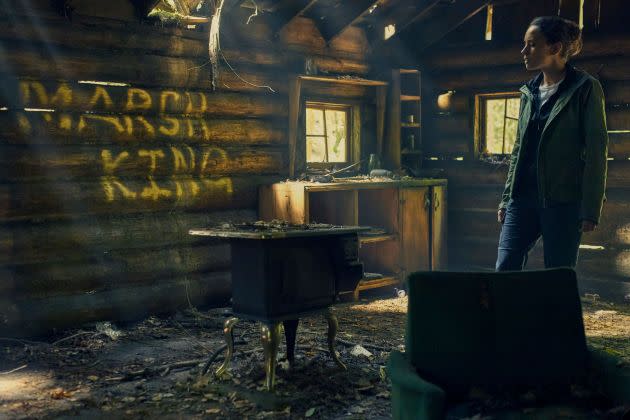‘The Marsh King’s Daughter’ Review: Daisy Ridley Turns Predator as a Woman Raised in the Wilderness by Her Sinister Hunter Father

Helena (Daisy Ridley), the title character of “The Marsh King’s Daughter,” is a woman living what she thinks is a safe, comfortable middle-class existence — just like the heroes of “Cape Fear” or “Straw Dogs.” And like those characters, she’s ripped out of her cocoon by a man with a vengeful agenda. In this case, the self-righteous stalker-invader is her father, Jacob (Ben Mendelsohn), who raised her in a cabin in the marshland wilderness of Michigan’s Upper Peninsula, teaching her how to hunt and survive. In the film’s early scenes (flashbacks to Helena’s childhood, where she’s played by Brooklynn Prince, the gifted actress from “The Florida Project”), we might almost be watching some off-the-grid version of the Laura Ingalls Wilder story, as Helena drinks in the woodland skills taught by Jacob, with each lesson marked by a homemade tattoo (he inks a deer on her neck when she gets her first kill).
As we discover, though, this Pa is no benevolent patriarch. He’s a violent criminal who kidnapped Helena’s mother when she was a teenager; she became pregnant, and their back-to-nature clan has been living in the woods in a state of hidden coercion ever since. The 10-year-old Helena knows nothing of this. But even after her mother (Caren Pistorius) launches a successful escape, spiriting Helena away on a stranger’s motorcycle (after its owner is shot and killed by Jacob), the girl’s loyalty remains not with her ravaged, depressed, PTSD mother but with the frontiersman father she grew up worshipping like a god.
More from Variety
So when Helena is an adult, and Jacob breaks out of a prison van and comes back to get her, she’s not just trying to fend off a villainous attacker. She’s fighting something in herself: the fact that her deepest feelings of identity were shaped by the monster father she still loves.
At least, that’s the idea behind Karen Dionne’s best-selling 2017 novel, which “The Marsh King’s Daughter” is based on. The movie is being marketed as a “psychological” thriller, but psychology is what it doesn’t have. It’s more like “Cape Fear” reduced to a “Predator” sequel. The director, the sometimes skillful Neil Burger (“Limitless,” “Divergent”), creates some tension in the middle third, where we follow Helena’s life in lower Michigan with her husband, Stephen (Garrett Hedlund), and her own daughter, Marigold (Joey Carson). The three are thrown into disarray by the news that Jacob, the Marsh King, has escaped. The fact that he’s known as the Marsh King is a little corny. (Is this a tabloid moniker or the name he chose for himself? It feels like both.) And Helena, in trying to steer clear of Jacob, has never told her husband about her past. When he learns of it, he’s angry. How could she have kept him in the dark? But as she perhaps correctly points out, if she’d been more honest they might never have made it past the first date.
Jacob, the Marsh King, hovers over the action, and the best thing about the movie is the high anxiety experienced by Helena when he has yet to show up. She can feel his spirit. Yet even as Daisy Ridley acts with a wary urgency, the upshot is that Helena, raised not by wolves but by a kind of human wolf, is supposed to be a huntress to her bones. And Ridley doesn’t have that quality; she’s too refined. I believed in her as the heroine of the last “Star Wars” trilogy, but in “The Marsh King’s Daughter” we don’t look at Daisy Ridley and see an inner animal spirit, a call of the wild.
The wild beckons her back, of course. The only way that Helena can put the demon of her father to rest is to return to the Upper Peninsula — a kind of northern bayou — and confront him there. As the Jacob we see in flashbacks, Ben Mendelsohn, while saddled with a fake-looking beard, summons a formidable aura; we see how he’s a furry patriarch and a psycho at the same time (which is the film’s way of saying that the patriarchy is psycho). But as the older Jacob, gray and a bit paunchy, he’s a slovenly destroyer, without that hint of twisted Davy Crockett nobility. The showdown between Helena and Jacob that everything’s been building toward is neither exciting nor distinguished. It’s just a rote action sequence, with no fear at work. The movie should have been called “Cape Mere.”
Best of Variety
Sign up for Variety’s Newsletter. For the latest news, follow us on Facebook, Twitter, and Instagram.

